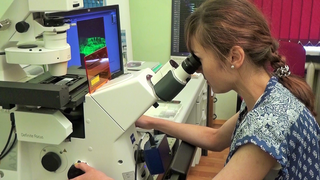 W
WObservation is the active acquisition of information from a primary source. In living beings, observation employs the senses. In science, observation can also involve the perception and recording of data via the use of scientific instruments. The term may also refer to any data collected during the scientific activity. Observations can be qualitative, that is, only the absence or presence of a property is noted, or quantitative if a numerical value is attached to the observed phenomenon by counting or measuring.
 W
WAn audience is a group of people who participate in a show or encounter a work of art, literature, theatre, music, video games, or academics in any medium. Audience members participate in different ways in different kinds of art; some events invite overt audience participation and others allowing only modest clapping and criticism and reception.
 W
WAn observation car/carriage/coach is a type of railroad passenger car, generally operated in a passenger train as the rearmost carriage, with windows on the rear of the car for passengers' viewing pleasure. The cars were nearly universally removed from service on American railroads beginning in the 1950s as a cost-cutting measure in order to eliminate the need to "turn" the trains when operating out of stub-end terminals.
 W
WEmpirical research is research using empirical evidence. It is also a way of gaining knowledge by means of direct and indirect observation or experience. Empiricism values some research more than other kinds. Empirical evidence can be analyzed quantitatively or qualitatively. Quantifying the evidence or making sense of it in qualitative form, a researcher can answer empirical questions, which should be clearly defined and answerable with the evidence collected. Research design varies by field and by the question being investigated. Many researchers combine qualitative and quantitative forms of analysis to better answer questions that cannot be studied in laboratory settings, particularly in the social sciences and in education.
 W
WIn common usage and in philosophy, ideas are the results of thought. Also in philosophy, ideas can also be mental representational images of some object. Many philosophers have considered ideas to be a fundamental ontological category of being. The capacity to create and understand the meaning of ideas is considered to be an essential and defining feature of human beings. In a popular sense, an idea arises in a reflexive, spontaneous manner, even without thinking or serious reflection, for example, when we talk about the idea of a person or a place. A new or an original idea can often lead to innovation.
 W
WIn the study of the human mind, intellect refers to, describes, and identifies the ability of the human mind to reach correct conclusions about what is true and what is false in reality; and how to solve problems. Derived from the Ancient Greek philosophy term nous, intellect derived from the Latin intelligere, from which derives the term intelligence in the French and English languages. The discussion of intellect is in two areas of knowledge that concern the relation between intelligence and intellect.In classical philosophy and in mediaeval philosophy the intellect (nous) is the subject of the question: How do people know things? In Late Antiquity and in the Middle Ages, the intellect was the conceptual means of reconciling the religious faith of monotheism with the facts of philosophy and science about Nature, a reconciliation that would make the intellect the conduit between the human soul, and the divine intellect of the cosmos. In the Late Middle Ages, philosophers developed the distinction that intelligence is in two modes passive intellect and active intellect.In psychology and in neuroscience, the Theory of Multiple Intelligences applies the terms intelligence (emotion) and intellect (mind) to describe how people understand the world and reality.
 W
WLooking is the act of intentionally focusing visual perception on someone or something, for the purpose of obtaining information, and possibly to convey interest or another sentiment. A large number of troponyms exist to describe variations of looking at things, with prominent examples including the verbs "stare, gaze, gape, gawp, gawk, goggle, glare, glimpse, glance, peek, peep, peer, squint, leer, gloat, and ogle". Additional terms with nuanced meanings include viewing, watching, eyeing, observing, beholding, and scanning. Looking is both a physical act of directing the focus of the eyes, and a psychological act of interpreting what is seen and choosing whether to continue looking at it, or to look elsewhere. Where more than one person is involved, looking may lead to eye contact between those doing the looking, which raises further implications for the relationship established through that act.
 W
WA phenomenon is an observable fact or event. The term came into its modern philosophical usage through Immanuel Kant, who contrasted it with the noumenon, which cannot be directly observed. Kant was heavily influenced by Gottfried Wilhelm Leibniz in this part of his philosophy, in which phenomenon and noumenon serve as interrelated technical terms. Far predating this, the ancient Greek Pyrrhonist philosopher Sextus Empiricus also used phenomenon and noumenon as interrelated technical terms.
 W
WA planetarium is a theatre built primarily for presenting educational and entertaining shows about astronomy and the night sky, or for training in celestial navigation.
 W
WPsychoanalytic infant observation is a distinct empirical case study method in psychoanalytic and psychotherapy training which was developed at the Tavistock Clinic in London by child psychoanalyst Esther Bick. In 1948 she collaborated with Dr John Bowlby to develop the approach as part of psychotherapy training. It has since become an essential feature of pre-clinical training in child and adult psychotherapy, psychoanalysis and related fields throughout the Western world.
 W
WScience is a systematic enterprise that builds and organizes knowledge in the form of testable explanations and predictions about the universe.
 W
WIn their most common sense, the terms thought and thinking refer to conscious cognitive processes that can happen independently of sensory stimulation. Their most paradigmatic forms are judging, reasoning, concept formation, problem solving, and deliberation. But other mental processes, like considering an idea, memory, or imagination, are also often included. These processes can happen internally independent of the sensory organs, unlike perception. But when understood in the widest sense, any mental event may be understood as a form of thinking, including perception and unconscious mental processes. In a slightly different sense, the term thought refers not to the mental processes themselves but to mental states or systems of ideas brought about by these processes.